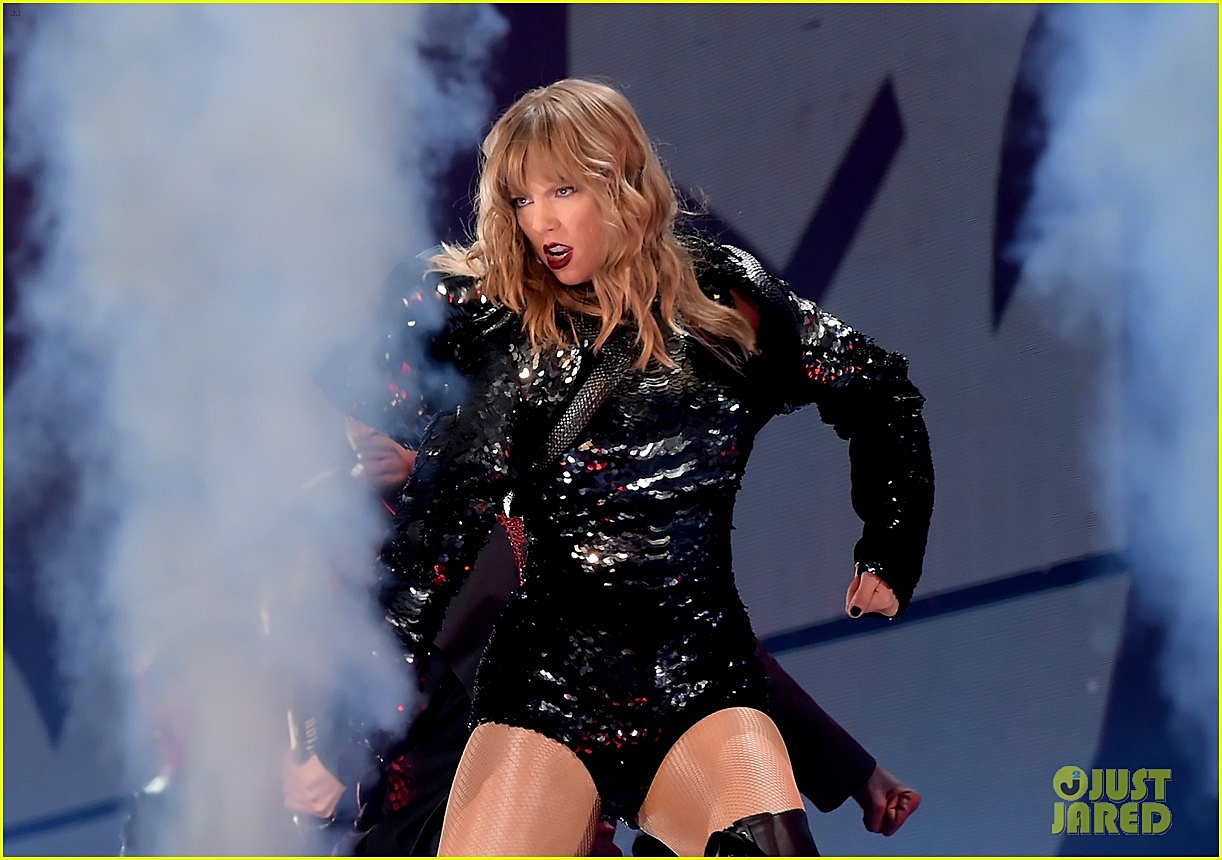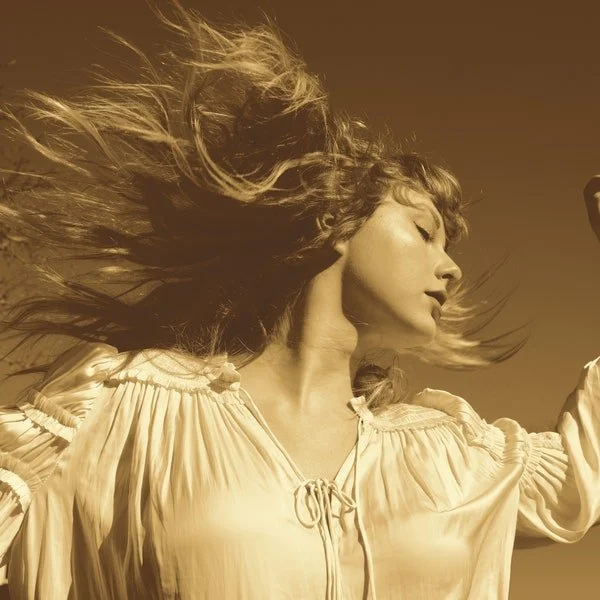Reassessing Taylor Swift's Reputation
Walking into Soldier Field’s open arena on the first day of June was like walking right into summer—the roaring heat could legit bake sidewalks. The whole arena simmered with a restlessness of youth that one often finds on a flashy summer day. Parties of excited girls were decked out in bold Reputation merch with blackletter Old English typefaces.
Suddenly, the lights dimmed and the crowd screamed and the opener blasted and fireworks exploded and the gate opened and a huge puff of mist attacked the stage, and the fire-and-fury herself stood center stage, with the hoodie pulled over her head and arms at her side, in over-the-knee black boots with a mic in her right hand, her face completely obscured.
Twelve years ago, she was just 16-year-old Taylor Swift debuting her first self-titled album. Then she became the Taylor Swift, a Fearless sensation who wasn't afraid to sing about her love and have all of America listen. A prolific songwriter, she held the title of America's sweetheart and resonated with millions of little girls who belted out her lyrics on car rides back from school. In Speak Now, she was the the mountain-mover whose glory soared in kingdom lights; in Red, she fashioned a vintage old-school look in her classic red NARS Dragon Girl lipstick. She then went on to "shake it off" in 1989—and we all thought she did—but Reputation is the album where Taylor. Swift. Snapped.
Taylor Swift had a game face on during the first few songs, narrowing her eyes and never letting a smile through. She did not address the sold-out crowd of 52,000 right away. Maybe she's someone who takes time warming herself to an audience. But suddenly the spiteful squint broke into a smile that reached her distinctive cat eyes. It was like, “I’m just playing.” She has an ability to blend fun and sass with her art. At one point, she had her back to the audience and swung rapidly from singing over one shoulder to the other shoulder, which I'd never seen anyone do before.
The middle-school girl next to me kept on saying, "Oh my god, oh my god." I had just said the same thing seconds ago. It happens that everyone has one or two special celebrities whose fame coincided with his or her starstruck teenage years. Music was a sugary balm that enlivened that somewhat sleepy, confused age, when nothing was really figured out. I grew up with Taylor Swift, knowing every word to her every song. However, now I'm a college student, less impressionable than I was five or ten years ago. When your celebrity revamps her image overnight, as a reasonable fan you think: do I really want to wear a snake ring and put on a T.S. snake hoodie? (I don't.) We are all growing up into our own selves, celebrities and fans alike.
Taylor Swift's voice sounded even better in real life than it did on her albums. It was softer, crystal-clear, and more like her voice from the earlier Fearless era. They probably edited her voice to glean a harsher and brassier edge for Reputation's studio-recorded tracks.
In concert, Taylor Swift likes to shoot her hand up into the air to the last word of every line she sings. A giant inflatable snake towered behind her during a song, and at some point she actually turned back and flicked her hand up at it to shoo it, which was funny in the moment. I saw all of her iconic moves, the hair-flip and playful shoulder bops. No one could top Taylor Swift's concert energy. The snake folded pathetically back at the end of the song.
The Reputation Tour's aesthetic felt campy, especially the oversized gilded snakes and drums that somehow looked like nods to Chinatown. But there was nothing disingenuous about Taylor Swift herself. She discussed her past year out of the public eye, and explained that she had considered what she would do, how she would spend her time, if there was no spotlight on her life at all.
She wrote about her dark days in the poem "Why She Disappeared." "Whatever you say, it is not right. Whatever you do, it is not enough. Your kindness is fake. Your pain is manipulative." Apparently, this was what had come of Taylor Swift's reputation.
She told the audience how she found a reason to return. "'Cause what I didn’t realize until recently is that...when I’m on stage and you’re here and we’re all singing the same words? That feeling that I get is like, it’s like this emotional validation right?"
"Like I write songs in my room by myself, and that’s a feeling that a lot of the time comes from extreme insecurity, like loneliness, like a feeling of—like I’m probably the only person feeling this type of humiliation..." She gave a little embarrassed laugh.
"...or this type of—like heartbreak or whatever. And when I stand on this stage and you guys are singing the words back it makes me feel like: oh my god it wasn’t just me, like they’ve been through this too!"
The media has called Taylor Swift "vanilla" for being bland. Some people think she's fake—"how can someone be that nice all the time, really?" I take it these are the Rocky Road and zesty-orange type of people. That's okay: people come in all flavors of ice-cream, and you don't have to like vanilla if you don't like vanilla. But the main reason people snub her is that she comes across as a petty person, and they have a good case: Taylor Swift writes the most romantic love songs and the most vindictive hate songs, often about the same person. That's pretty scary to think about, and in my opinion this vengeful streak and name-calling in the affairs of dating is a major shortcoming for Taylor Swift.
For normal people, getting angry is usually rare and blows over quickly. But for Taylor Swift, it's eternalized in radio playbacks and iTunes repeats. That's her job. That's what happens when you attach an incredibly catchy melody to your life story and send it out from your studio to become a public spectacle. Personally, I don't agree with the unforgiving, hurtful aspect of Taylor Swift's songwriting. But I appreciate her talent to translate into words the relatable, wonderful, real feelings that we all experience. She doesn't water down how she feels. It takes a powerful imagination to jot down lyrics on a napkin like she did for "Our Song," and a hard head to crash through walls like she did in "Long Live." Taylor Swift sang both songs for Chicago, performing "Our Song" as a wild card, and an acoustic medley of "Long Live" and "New Year's Day" on the piano.
The evening felt steady; the sky was wide and high above us. I realized that Taylor Swift is the whole package. She can play the piano and the guitar. She can sing with background music and just by herself. She can be delighted and sad, afraid and lonely, hurt and angry. How is she fake? She is real enough.
Throughout the concert, Taylor Swift repeatedly thanked her fans for "caring." She was grateful that they cared about "lyrics and melody and feeling;" she was grateful that they cared when she took time off to regain her focus and take a breather.
"It's basically saying that you care about reading someone's diary for fifteen years," said Taylor Swift, a people-pleaser at heart.
She chose to end the night with "This Is Why We Can't Have Nice Things." At first, I wondered why she didn't end with a sweet happy song. As I thought about it, I understood that the song calls attention to the reality of life, which isn't always flowers and puppies. With Reputation, Taylor Swift set an example of how you absolutely must fight your battles to honor your dignity. The Taylor Swift I saw on Jun.1 at Soldier Field was not America's sweetheart, but a woman who gave a voice to herself, and held power in her ability to enchant listeners year after year with a pen, guitar, and microphone. The years of drama and adversity has had her sharpen her priorities. Taylor Swift can have nice things, by saving her nice for the people who appreciate her vanilla, and channeling her energy towards the ones who have cared all along and the career she has a passion for. In doing so, she harvests a personal store of sunlight and softness to consistently love and give back to the world.
Taylor Swift descended on the stage lift, waving furiously, her gestures reaching even those sitting in the highest rows of the echoing stadium. Some words appeared on the black screen: "and in the death of her reputation, she felt truly alive."
As the stands rapidly cleared, Soldier Field became dark and chilly. The night was ink blue. But there was light somewhere backstage at her afterparty. There was a warm light passed onto me from the evening of songs. There was light just around the bend, to be anticipated, like coming back home at the end of the day to familiar footing and bright kitchen lights. There were nice things to be hopeful for.
I thought: the people close around her—her family, Joe Alwyn, and good friends know the real her. They love her, and that is all that matters, even if the greater world of critics and strangers send her hate.
And there was no more reputation. There was only Taylor Swift.
Feature image via















